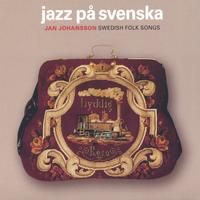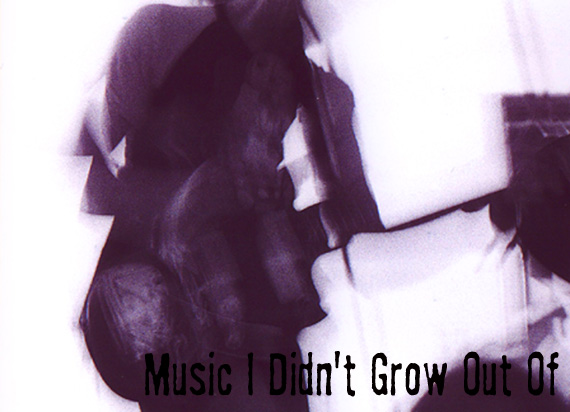 I won't call this a jazz album, since that's gotten me into trouble before, but I will say that Jazz på Svenska, Jan Johansson's 1965 album of Swedish folksongs interpreted with piano and upright bass alone, is easily one of the most beautiful albums I've heard, and one of the saddest. Jazz certainly influences and to an extent determines some of the sound, style, and flourish to this record, but to describe it simply as a jazz record is to do a disservice to it and to jazz. It's something beyond jazz, but because of jazz.
I won't call this a jazz album, since that's gotten me into trouble before, but I will say that Jazz på Svenska, Jan Johansson's 1965 album of Swedish folksongs interpreted with piano and upright bass alone, is easily one of the most beautiful albums I've heard, and one of the saddest. Jazz certainly influences and to an extent determines some of the sound, style, and flourish to this record, but to describe it simply as a jazz record is to do a disservice to it and to jazz. It's something beyond jazz, but because of jazz.This is an album of Swedish folksongs interpreted by two masterful jazz musicians, Johansson, a deft pianist and protégé of Stan Getz, and bassist Georg Riedel. The arrangement is minimal: piano and bass, the echo of ringing notes, and nothing else. While there are notes and touches throughout the album that swing, for the most part the album seems to follow a tonal scale divorced from what a lay-person (that is, I) would identify as jazz. It just doesn't sound like jazz, but it doesn't quite sound like precisely anything. Sure, it sounds like Swedish folksongs, I guess. At times it sounds almost like Glenn Gould (minus the muttering and embellishment). But it sounds less like any other music and more like a range of moods-- it drifts between generous warmth and desolate cold, between intimacy and lonesome abandon. There are tones and moments that seem to have all the deepest feeling imaginable bound up inside them; it's not hard to hear grief and despair here, helplessness and horror, but there is also faith and awe and wonder in abundance. This is a record that has given me goosebumps, over and over, which has at times chilled me with a sense of how truly alone I was, while at other times has reassured me of the unequivocal safety of the foundations of my life and relationships. It's not hard to find everything you feel expressed more precisely in this record.
As a means of explaining this, I'll offer the following story: in the spring of 2006, I felt as though I was at a point of intersection as far as my career was concerned. For several long years I had sought out one particular job, built up my qualifications so as to make myself more desirable to employers in that field, and endured several harrowing interviews. Finally, I got some work, and later, some more. By the time the third round of work came around, I was having drastic second thoughts, recognizing many of the grim faults in the job that I had not, in my dumbfounded fantasies of employment, imagined would come into play. By early winter 2006 I had begun to consider stepping away from the field of my aspirations, but when spring rolled around and it was once more time to send in applications, I dutifully filled out and faxed off my forms.
I had already been working for one particular outfit, but mid-week in late April I got word that union rules required they re-interview me for the job I'd already done. The interview was to be on Monday; on Friday I was stricken with some crisis of conscience. I couldn't bear to go on with the work, I figured. I hated it-- it was nothing like I'd imagined it would be. I hated myself, too, since I'd stupidly spent as many as seven years focused on a single goal that I now seemed to have to abandon. But between the ache of making active disappointment and the woe of letting drop my hard-won goal, disappointment still seemed the worse. On Monday morning I determined I was through, but nonetheless would still go to the interview out of courtesy for my colleagues: I put on my best suit and tie and headed out early for the 90-minute metro-bus combination that would take me to the job site.
Being late April, there was a cold rain coming down, mostly as a mist at first. I drifted over me as I followed Duluth street from my corner down to St Denis, where it thickened. As I ducked into the metro station it had begun to come down heavily, and waiting for the bus I felt it had grown dense and determined. Without an umbrella, I was soaked before my bus arrived: rain was dripping along my scalp and crawling past my tie-cinched collar. What little light there was in the sky was greyish yellow, as though passing through a grease-stained paper plate. I was miserable, beaten, and soaked, finally recognizing that the future to which I'd aspired was essentially a fiction in which I could not live comfortably, and at a loss for an alternate course. Having no future needed not, as I'd imagined it in my teenaged years, necessarily be set to punk rock. As the bus pulled away from Lionel-Groulx station, I leaned my dripping head against the window and put Jazz på Svenska on my discman, over which I could hear only the rhythm of the bus's windshield wipers and the occasional crackle of the radio. For the duration of the ride, that music was the only thing in the world, and the most beautiful thing. Then I got off.



1 comment:
Unfortunately the link is dead. I just discovered the lovely melancholy music of Johansson, and I would love to hear this and anything else you have by him. Thanks.
Post a Comment